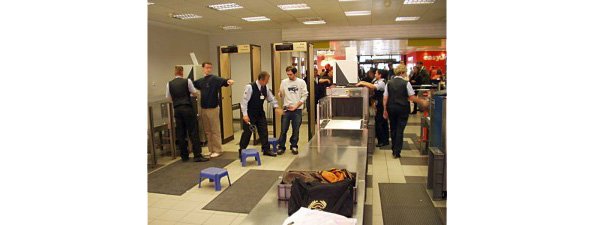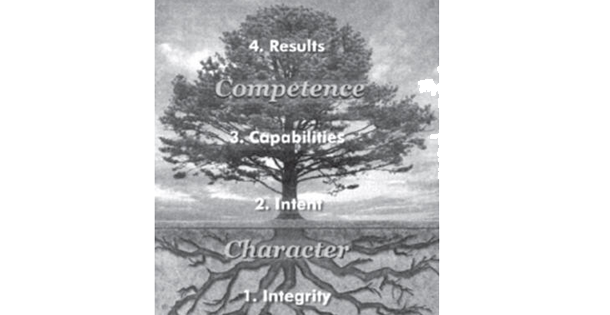The No. 1 Responsibility of a Leader: Trust
"I contend that the ability to establish, grow, extend, and restore trust is not only vital to our personal and interpersonal well-being; it is the key leadership competency of the new global economy." - Stephen M. R. CoveyStephen M. R. Covey (the son of Stephen Covey of 7 Habits fame) believes that the number one job of any leader is to inspire trust.
Trust affects everything: we are hired on the basis of it; we build the success of our careers on it; all marketing, advertising and sales (the very life blood of every organisation) is dependant on creating it with customers; leaders rise and fall under its weight; and all our relationships (personally and professionally) are held together by this invisible glue — this thing called "trust."
"You can't have success without trust. The word trust embodies almost everything you can strive for that will help you to succeed. You tell me any human relationship that works without trust, whether it is a marriage or a friendship or a social interaction; in the long run, the same thing is true about business, especially businesses that deal with the public." - Jim Burke, Former Chairman and CEO, Johnson & Johnson
Covey, once told that trust is something that "you either have or don't have, and there's nothing you can do about it," is passionately convinced otherwise. He doesn't believe that trust is simply a nice-to-have social virtue, but sets out to demonstrate the business case for it as a hard-edged economic driver.
That's why this book is so useful — it provides a comprehensive sweep of all the elements that go into trust, and crucially for leaders, it articulates useful models for how it can be improved. Below is a very short summary of some of the key ideas.
The Speed of Trust Formula:
Trust always affects two outcomes — speed and cost. Covey uses a formula to explain:
- When trust is LOW the speed of doing business slows down and the cost goes up.
- Conversely, when trust is HIGH the speed of doing business accelerates and the cost falls.

Example: Immediately following the 9/11 terrorist attacks, trust in flying went down dramatically. More robust procedures and systems were put into place to increase safety and trust in flying, but it now takes longer and costs more for everyone (airports, airplane companies, and passengers) to travel.
The 4 Cores of Credibility:
Trust is a function of both Character and Competence. Leaders can't survive without having both.

Character:
- 1.Integrity: includes being honest, but is much more. It also means walking your talk and having alignment of behaviours and values.
- 2. Intent: when we are unsure about a person’s motives, we are suspicious of everything they say and do.
Competence:
- 3. Capabilities: you can’t have credibility if you don’t have skills to perform.
- 4. Results: your track record; evidence of competence; the actual performance.
13 Behaviours:
Covey gives a list of 13 Behaviours, with a chapter dedicated to each, on how trust can be improved.
Character:
- Behaviour #1: Talk Straight
- Behaviour #2: Demonstrate Respect
- Behaviour #3: Create Transparency
- Behaviour #4: Right Wrongs
- Behaviour #5: Show Loyalty
Competence:
- Behaviour #6: Deliver Results
- Behaviour #7: Get Better
- Behaviour #8: Confront Reality
- Behaviour #9: Clarify Expectations
- Behaviour #10: Practice Accountability
- Behaviour #11: Listen First
- Behaviour #12: Keep Commitments
- Behaviour #13: Extent Trust
There's a lot more to this book than the summary here will do justice. Overall, it's a unique business book that every leader should have on their bookshelf. By the time you're through, undoubtably there will be one quote left ringing in your ears:
"As you go to work, your top responsibility should be to build trust." - Robert Eckert, CEO, Mattel
Topics:
Leadership
Theo Winter
Client Services Manager, Writer & Researcher. Theo is one of the youngest professionals in the world to earn an accreditation in TTI Success Insight's suite of psychometric assessments. For more than a decade, he worked with hundreds of HR, L&D and OD professionals and consultants to improve engagement, performance and emotional intelligence of leaders and their teams. He authored the book "40 Must-Know Business Models for People Leaders."

/Tim%20Ferriss%20and%20a%20Furious%20Monkey.png?width=374&name=Tim%20Ferriss%20and%20a%20Furious%20Monkey.png)
.png?width=374&name=Smarter%20Thinking_%20The%20Socratic%20Method%20(9).png)
We Would Like to Hear From You (0 Comments)